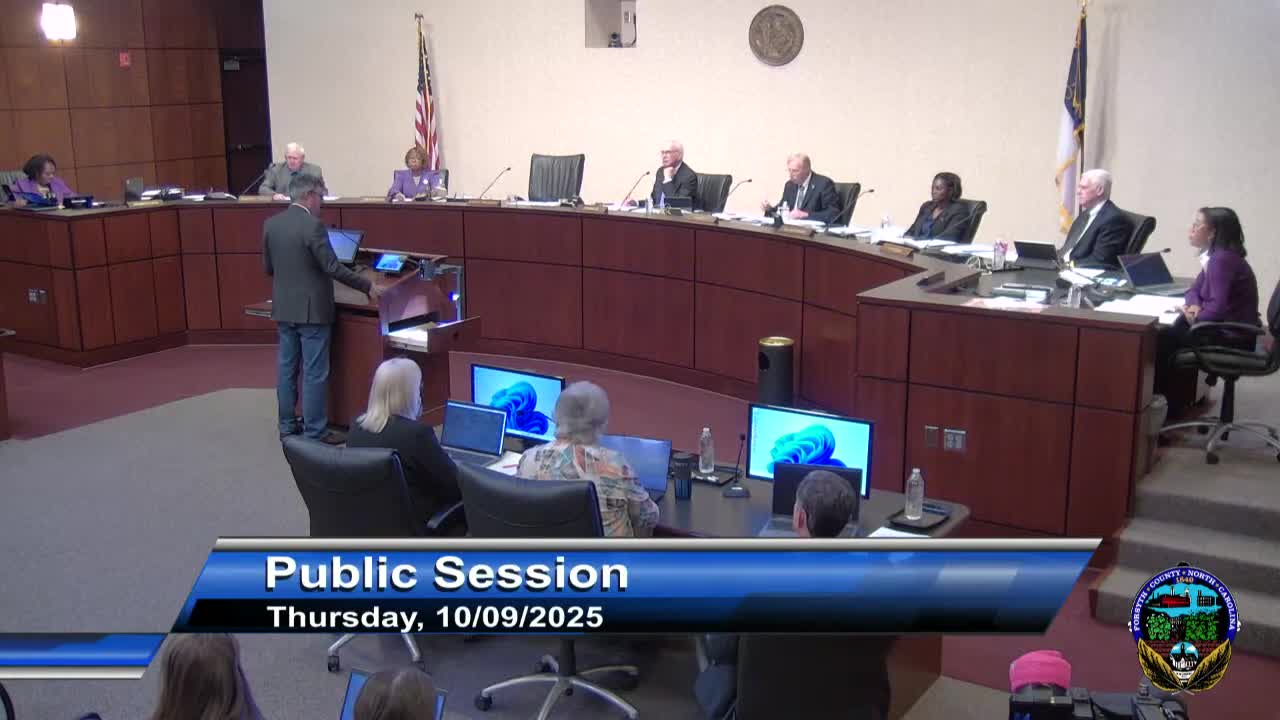Forsyth County approves conditional, dollar-for-dollar forgiveness to address $5.03M school-system debt; debate centers on accountability
Get AI-powered insights, summaries, and transcripts
Subscribe
Summary
Forsyth County commissioners voted 5–2 on Oct. 9 to approve a resolution that conditionally forgives up to $5,026,336.90 of the debt Winston-Salem Forsyth County Schools owes the county, contingent on privately raised funds being applied dollar-for-dollar to repay state and other creditors.
The Forsyth County Board of Commissioners voted 5–2 on Oct. 9 to approve a resolution that allows conditional forgiveness of up to $5,026,336.90 that Winston-Salem Forsyth County Schools (WSFCS) owes the county — provided privately raised funds are used, dollar-for-dollar, to repay the district’s outstanding debt to the North Carolina Department of Public Instruction (NCDPI) and other creditors.
County attorney Gordon Watkins introduced the resolution and described its mechanics: privately raised funds would be forwarded “as soon as practicable to NCDPI to repay the NCDPI debt,” the county manager would verify repayments, and the county would forgive an equal portion of the county debt after NCDPI confirmed repayment. The resolution caps total county forgiveness at $5,026,336.90 and requires any forgiveness to occur on or before Dec. 31, 2025, unless the Board of Commissioners amends that deadline.
Watkins and county staff clarified the legal framing: the county’s claim is based on an interlocal agreement for services (nurses and school resource officers) and staff described the unpaid amounts as a county receivable caused by WSFCS failing to reimburse the county. County Manager Kirby Robinson said because the school system did not reimburse the county by Sept. 30, 2025, the amount will show on the county’s annual audit and reduce the county’s fiscal year 2025 fund balance.
The draft resolution delegates verification tasks to the county manager and requires WSFCS — or any private organization raising funds on its behalf — to notify the county manager within five days of each repayment, including the repayment source. The resolution directs that privately raised funds be applied first to the NCDPI debt (reported at roughly $3.4 million at the meeting) and then, if any privately raised money remains, to other creditors as jointly authorized by the WSFCS Board of Education and the Forsyth County Board of Commissioners.
Public comment was extensive and sharply divided. Supporters of conditional forgiveness argued the measure would avert immediate cuts and layoffs in schools. Jennifer Easter, president of the Forsyth County Association of Educators, said the move “is about protecting the human infrastructure of our schools and our children's educational future.” Valerie Broganbrough told commissioners that, despite anger about the district’s financial mismanagement, “staying angry and assigning blame won't fix the problem” and urged them to “be champions of public education.”
Opponents challenged the process and pressed for greater accountability. Several speakers said the public needs clearer, verifiable information about the district’s finances before the county waives any debt. Alan Daniel, a resident who frequently spoke during the meeting, argued that publicly reported figures were inconsistent and said: “The most prevalent misstatement is that the original debt was $46,000,000 at the amount owed is $37,000,000. That is incorrect… the actual total of the debt was between $60 and $65,000,000.” Others said using private donations to solve a public financial misstep would set the wrong precedent.
Commissioners debated the proper balance between accountability and avoiding immediate harm to students and employees. Commissioner Woodbury and others said that private donations paired with conditional forgiveness could avoid personnel cuts this year and that state authorities (NCDPI) were already charging interest and requiring the district to submit a repayment plan to the state board of education by early November. Commissioner Wilson said she was reluctant to authorize any county payment to the school system but was willing to consider a dollar-for-dollar match by private resources.
Following discussion, Commissioner McDaniel moved to approve the resolution; Commissioner Bessie seconded. The board approved the resolution 5–2. Commissioners Martin, McDaniel, McDaniel (mover), Bessie (seconder), Linville and McDaniel (vote count wording note: the transcript identifies motion and seconder; vote was recorded as 5 affirmative and 2 opposed) supported the measure; two commissioners opposed. The motion included the procedural details: verification by county staff, notification requirements, a maximum forgiveness cap of $5,026,336.90, and a deadline of Dec. 31, 2025, for forgiveness to take place unless the board amends the resolution.
What the resolution does and does not do: it does not transfer county general funds immediately to WSFCS; forgiveness is conditional on privately raised funds that must be used to retire the NCDPI debt and then other agreed debts. The county’s forgiveness applies only to the county receivable described in the resolution and not to other WSFCS debts.
Next steps and accountability: county staff were authorized to coordinate with WSFCS, NCDPI, and other parties to verify that privately raised funds were applied to the specified debts. Commissioners and members of the public repeatedly emphasized the need for independent audit work and stronger financial controls within WSFCS; the board also noted that a separate audit and investigations are underway and that accountability measures remain a priority.
Limitations: the resolution depends on private fundraising and on verification by county staff and NCDPI; it does not resolve broader questions about the district’s total indebtedness or the underlying causes of prior misspending. The board’s action delays immediate cuts tied to repayment in the short term only if private donors step forward and the funds are verified and applied as required by the resolution.
